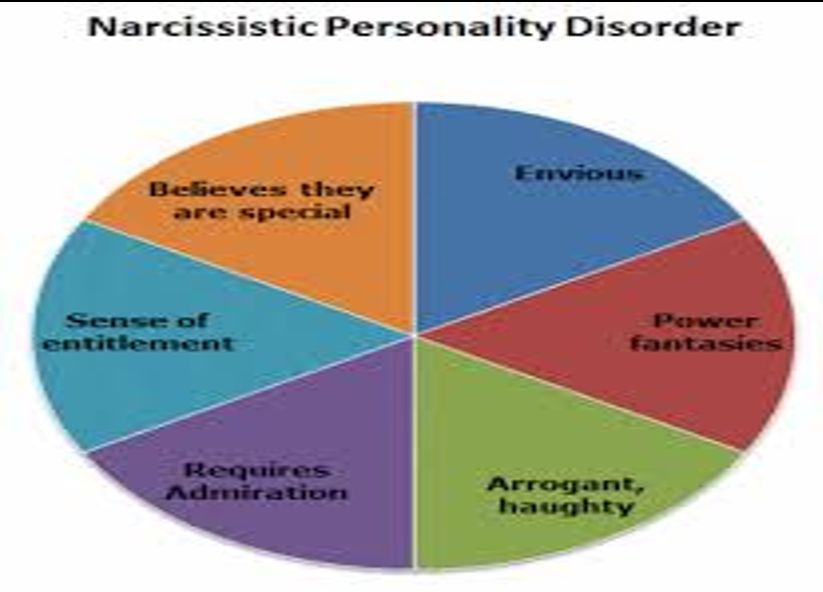
Personality disorders are a group of mental illnesses. They involve long-term patterns of thoughts and behaviors that are unhealthy and inflexible.
These are inner experiences and behaviors that often differ from the expectations of the culture in which someone lives. There are 10 types of personality disorders-
- Antisocial personality disorder
- Avoidant personality disorder
- Borderline personality disorder
- Dependent personality disorder
- Histrionic personality disorder
- Narcissistic personality disorder
- Obsessive-compulsive personality disorder
- Paranoid personality disorder
- Schizoid personality disorder
- Schizotypal personality disorder
Narcissistic Personality Disorder (NPD)

- NPD is a type of personality disorder in which people have an inflated sense of grandiosity in themselves. They need excessive admiration and attention. The person with NPD feels that they are unique and special & they have diminished ability to empathize with others’ feelings. A narcissistic personality disorder is one of the eleven sub-types of the broader category known as personality disorders.
=> People with NPD:-
- Tend to take advantage of others to achieve their goals.
- Have a tendency to exaggerate their achievements and talents.
- Individuals with the condition tend to have very fragile self-esteem.
- People with NPD may be generally unhappy and disappointed when they’re not given the praise or special favors, they believe they deserve.
- NPD is very uncommon between 0.5-1% of the general population or one in hundred people. The disorder is more common in men (7.7 %) than women (4.8%).
Narcissist: Overview

- A narcissist personality means a person who is overly self-involved, and often vain and selfish. They need too much admiration for themselves. Up to a certain level, the narcissism behavior is good but the excess of this may lead to a serious situation like generating narcissistic personality disorder. Some example of this behavior is Adolf Hitler, Madonna, Joan Crawford, etc.
Narcissist Subtypes

- The Diagnostic and Statistical Manual of Mental Disorders (DSM-5), the handbook therapists use to diagnose personality disorders, identifies the nine traits that make up a Narcissistic Personality Disorder. While DSM does not break down NPD into subtypes (and therefore these are not official diagnoses), others have identified various types of narcissists.
1) The Overt type
- Known as grandiose narcissism.
- People with overt narcissism are typically extroverted, bold, and attention-seeking.
- They may become aggressive or violent if the person or situation challenges their sense of status.
2) The Covert type
- A person with covert narcissism may come across as shy, withdrawn, or self-deprecating.
- However, they will still be self-absorbed and believe that they are better than others.
3) The Hypervigilant Type
- A person with this type of narcissism have fear of rejection & abandonment.
- They are very hypersensitive to others.
- They constantly engaged in fights etc.
4) The Oblivious Type
- Insensitive to others.
- They feel they are un-adored.
- Attention-seeking & grandiose.
5) The Exhibitionist Type
- They think of themselves to be better than everyone else.
- They are very status conscious and materialistic.
- They think they are very special.
6) The Sexual Type
- These types of people only care for their own sexual satisfaction.
- They believe they have the right to sex.
- They have a self-centered view of sex.
7) The Malignant Type
- They are also called pathological narcissists.
- They tend to exhibit grandiose attitudes, feel superior to others, need excessive praise & validation.
- They respond very poorly to even the slightest criticism.
Narcissism & Narcissistic Personality Disorder
Narcissism is a personality trait that every person possesses to some degree. Like any characteristic, it exists on a spectrum. In fact, a certain amount of self-centeredness is healthy. Narcissism contributes to confidence, resilience, & ambition.
While a person who is excessively high in narcissism is said to have a narcissistic personality disorder (NPD), which is a mental illness. A person with narcissistic traits may be mildly self-centered at times, but NPD, on the other hand, is a deeply ingrained, pervasive pattern.
Narcissistic Personality Disorder Symptoms

- Signs and symptoms of narcissistic personality disorder and the severity of symptoms vary. People with the disorder can:
- Have an inflated sense of self-importance and entitlement.
- Needing constant admiration, recognition & expect special treatment.
- Be envious of others and believe others envy them.
- Behave in an arrogant or haughty manner, coming across as conceited, boastful, and pretentious.
Causes of Narcissistic Personality Disorder

- The exact causes of narcissistic personality disorder are not known yet. However, inherited genetic defects are thought to be responsible for many cases of NPD. Other causes may be-
- Neurobiological
- Childhood abuse or neglect.
- Cultural influences.
- Excessive parental pampering
- Unrealistic expectations from parents.
- Sexual promiscuity (often accompanies narcissism)
- Genetic
Diagnosis Of Narcissistic Personality Disorder

Personality disorders are difficult to treat. Persons with Narcissistic Personality Disorder are unlikely to seek treatment and are often highly defensive about their narcissism. Even when they seek treatment, they may struggle to recognize their narcissistic traits, or blame others for their difficulties. There are no lab tests to diagnose narcissism. Treatment for NPD primarily consists of talk therapy, also known as psychotherapy.
Talk therapy can help you learn how to relate better to others so your relationships can become more enjoyable, intimate, and enjoyable. Talk therapy can also show you how to:
- Improve your collaboration with coworkers and peers.
- Better relate with others so your relationships are more intimate, enjoyable and rewarding.
- Recognize your strengths and potential so you can tolerate criticisms or failures.
- Cope with any self-esteem issues.
- Set realistic goals for yourself.
Top 13 Interesting Facts About the NPD
The term “narcissism” comes from a first-century book written by the Roman poet Publius Ovidius Naso, known in English as Ovid.
Ovid’s book “Metamorphoses” had a character named Narcissus. Narcissus was a handsome & proud young man. Upon seeing his reflection on the water for the first time, he became so enamored that he could not stop gazing at his own image. He remained at water’s edge until he died.
Personality disorders are a group of mental illnesses. There are about 10 specific types of personality disorders.
The NPD is also a personality disorder in which people have an inflated sense of grandiosity about themselves. They become self-centered, arrogant.
The exact cause of NPD is not known yet.
NPD is more common in men (7.7%) than women (4.8%).
The Narcissistic person craves admiration, recognition.
Narcissism is stated in which people think of themselves as superior to all others.
Narcissism is self-love and up to a certain level it is very good but the increase in this can lead to serious conditions.
Narcissist people always take advantage of others. They use other people as their resources for success.
The exact medication for the NPD is not known to date.
The Psychotherapy “Talk Therapy” can diagnose narcissistic personality disorder.
Personalities like Adolf Hitler, Madonna, Joan Crawford, etc. are said to have been suffering from this disorder.
- Narcissistic Personality Disorder is a mental health condition. Every one of us wants to feel “OK” in our own eyes. We’re all under pressure to like our ideals, to make ourselves into a certain image, and we do all sorts of things to create the illusion that we’re fine, including lying to ourselves and others. Some peoples maintain this situation up to a positive level. Those who struggle with this may be likely to develop NPD or any other personality disorder. But with the treatment, meditation, talking to family members we can learn healthy ways to fulfill our needs and get over this NPD.






